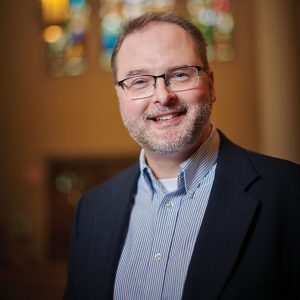 From our Director of Faith Formation, Todd Gale…
From our Director of Faith Formation, Todd Gale…
In the second chapter of Matthew’s Gospel, we read that the Magi traveled from the east when they saw a dazzling star that led them to worship the Christ child. We call this Epiphany. What exactly led them to Bethlehem has been debated for centuries: a comet, a conjunction of stars with the planet Jupiter, an unusual view of Venus, or a supernatural occurrence? Magi are typically thought of as Persian priests and wise men who may have followed the teachings of Zoroaster. They would have been the most educated “scientists” of their day, gaining tremendous respect from all people in the ancient East. Why would they care about the birth of the Jewish King, a Messiah for the Israelites? The answer may take us back almost six hundred years prior to the prophet Daniel. Daniel was an Israelite taken captive by the Babylonians in the region East of the Holy Land. Daniel made his way to the high office of “chief of the magicians, enchanters, astrologers and diviners” (Daniel 5:11)–in other words, he was appointed Chief Magi! Surely his amazing visions and faith were handed down through the centuries. It very well could be that the travelling Magi were distant disciples of Daniel!
The first Sunday after January 1st is when the Catholic Church in the United States celebrates Epiphany. Historically, most Christians celebrate Epiphany on the 12th day after Christmas, January 6. It is a Holy Day of obligation in many countries. In North America we transfer the celebration to the Sunday closest. The Christmas Season, liturgically in the Catholic Church, is from the Christmas Eve Vigil Mass until the Baptism of the Lord; it includes the celebration of the Holy Family and Epiphany.
Epiphany is an important festival in Spain, where it’s also known as the festival of the three Magic Kings. It is tradition that Spanish and Italian children receive presents on this day. In Mexico, Epiphany is known as the day of the Three Kings and it includes eating a cake that has a figure of Baby Jesus baked inside. Whoever finds the baby Jesus has the honor of being the ‘Godparent’ of Jesus for that year. There is a Belgium tradition much like American Halloween, where children dress as the Three Kings and go door-to-door singing for sweets and treats. In Ireland, it has become popular that the women get the day off and men do the cooking for a tea and cake gathering!
Sorry to destroy the typical nativity scene, but Scripture does not actually give a number of Magi. We generally think there were three because of the three gifts: gold, frankincense and myrrh. Some scholars say there may have been hundreds of Magi, or maybe several Magi with an entourage of soldiers and officials—that’s how King Herod would know they had entered the land; there may have been a caravan. Some traditions say there were twelve wise guys in total.
Ancient legends name the three as Melchior, Caspar, and Balthazar sometimes depicted as the kings of Persia, India, and Arabia. Another tradition sees them as being three races: Asian, African and European, each coming back to the Holy Land from the different continents to reverse what happened in the days of Noah when his three sons went out away from the Holy Land to populate the earth. Now the nations of the world are symbolically returning to worship Christ.
Another thing that unravels our crèche scene: Scripture does not say the wise men came immediately to the manger to see the baby Jesus. St. Matthew says they followed the star to where “the child was” and “upon entering the house” they knelt before him and worshipped. Since King Herod then sent word out to kill all the children two years and younger in the area of Bethlehem, some scholars suggest it could have been up to two years after the actual birth. Jesus may have been a toddler!
In general, an epiphany is an “Aha!” moment; it’s the light bulb turning on, when someone is struck with a realization that often can change their life. In Christianity, the epiphany we are looking for is that moment of recognition that we are personally loved by God the Father, and God the Son gave his life as a sacrifice for our sin. He took our sin and gave us his life and his Holy Spirit. Jesus trades places with us in the great exchange that is given us for free. We cannot earn it. We do not deserve it. We are asked to respond with “YES” in faith and take a step to love God and others. I have personally been so, so blessed to walk alongside many hundreds of people throughout the years who have had an epiphany. To see tears of joy, faces of relief, hands open to God’s invitation is to witness holy and miraculous moments. What a treasure to spend time with people on this sacred ground.
We at St. John, St. Joseph, and in the Diocese of Lansing invite you to join us in 2020 to come before the Living Jesus. Turn your worship and your will over to him. And if you have had an epiphany and are motivated to share your experience with others to build the Kingdom, please come and join our team of disciples on a mission! Let’s journey together to the babe and see what he has in store for us in 2020.